The Sykes-Picot agreement one hundred years ago created Arab nation-states with borders drawn by the colonial powers. As a result, partition, isolationism, and instability have marred these countries. At the same time, Sykes-Picot created favourable conditions for the establishment of Israel in Palestine, in a weak, backward, and disjointed Arab environment.
A few years ago, the Arab peoples in the region rose up in revolutions that carried their aspirations for freedom, renaissance, and unity, but they were soon with the iron fist of the repressive regimes and foreign intervention, which fuelled further sectarian and ethnic fragmentation. The conflict in and for the region once again carried the risks of a new Sykes-Picot, with new maps being drawn in accordance to norms that serve the Zionist project and the major powers. These risks must therefore be addressed with a project for renaissance and unity.
On this occasion, al-Zaytouna Centre for Studies and Consultations held a panel discussion titled One Hundred Years After Sykes-Picot, New Maps are Being Drawn, at the Crowne Plaza Hotel in Beirut, Thursday 26/5/2016.
The event, which featured three sessions, was attended by several renowned Arab and Palestinian affairs experts. The first session’s theme focused on Sykes-Picot: Analysis of Background, Implementation, and Repercussions. The second focused on: The New Maps Being Drawn, an Analysis of the Regional Dimension. And the third session was titled: New Maps Being Drawn, an Analysis of the International Dimension.
Opening Speech and the First Session
In his opening speech, Dr. Mohsen Mohammad Saleh, the General Manager of al-Zaytouna Centre, welcomed the audience and overviews the key themes that the conference would address.
The first session, moderated by Nafez Abu Hasna, journalist and director of Palestine Today satellite channel, discussed the first theme: Sykes-Picot: Analysis of Background, Implementation, and Repercussions. During the session, the speakers were Dr. ‘Ali Mahafzah, professor emeritus in the Department of History at the University of Jordan; Saqr Abu Fakhr, editorial affairs editor in the Beirut branch of the Arab Center for Research and Policy Studies; Mahmud Haidar, researcher and writer; and Jawad al-Hamad, head of the Middle East Studies Center in ‘Amman.
In his paper, Dr. Mahafzah overviewed the historical background of the Sykes-Picot Treaty, and its impact on the geopolitical map of the Arab Orient between 1916 and 2016. Mahafzah stressed that those behind Sykes-Picot were keen not to allow the emergence of a large state that could pose a threat to their interests, and thus sought to sustain the smaller states. There were two main reasons, he continued, why the treaty succeeded and survived: the first is the failure of the establishment of a comprehensive pan-Arab project; and the second is the refusal of the Arab states after their independence and decolonization to establish pan-Arab unity and a unified pan-Arab state. This is because the leaders of these countries wanted to rule monopolistically, thus leading to the survival of Sykes-Picot to the present day.
Abu Fakhr spoke about the circumstances and implications of Sykes-Picot, which created four entities, namely, Lebanon, Palestine, Syria, and Jordan. These countries did not have separate local national identities and features, but all shared the same history, despite the attempts by those behind Sykes-Picot to highlight a supposed different identity for each. Abu Fakhr said the Palestinian national identity crystallized not because of its repulsion with the Syrian identity, but rather because of its confrontation with attempts to efface it by Israel since the latter’s creation in 1948.
In his paper, Haidar said what was happening in the Arab world is not a departure from the essence of Sykes-Picot, stressing that there was a fundamental link between the logic of Sykes-Picot and the current scene. Haidar said there were three contexts for the engines of Arab political culture: the context of subservience; the context of resistance; and the context of ambiguous change.
Jawad al-Hamad, for his part, argued that the establishment of Israel was to cement the partition brought about by Sykes-Picot. He said there were mutual services between the Western European project and the Zionist project. However, he continued, the Zionist project was not able to achieve its full goals, which include establishing “the Great Israel,” and could not impose its legitimacy in the region. Instead, it has witnessed huge setbacks, with withdrawals from Lebanon, Gaza Strip (GS), and other Arab lands in peace and in war, which means the Zionist expansionist project has hit an impasse.
Second Session
The second session, which was moderated by Ma‘an Bashour, member of the Secretariat of the Arab National Congress and deputy secretary general, tackled the second theme: New Maps Being Drawn, an Analysis of the Regional Dimension. The speakers were Dr. ‘Imad al-Hout, Lebanese MP; Dr. ‘Abd al-Hussein Sha‘ban, Iraqi thinker and expert on Arab and international issues; Dr. Bahaa‘Bukarrum, member of the Leadership Council of the Progressive Socialist Party; Dr. Majdi Hammad, Former President of the Lebanese International University in Beirut; Muhammad al-Rashid; and Dr. Ahmad Nawfal, Professor of Political Science at Yarmouk University, Jordan.
Dr. ‘Imad al-Hout spoke in his paper about projects of the fragmentation and partition of the Arab region. He argued that these projects were fuelled by three main factors: the weakness of the central authority; foreign intervention linked to regional and international projects; and the tendency of the regions to form independent administrations. Dr. Hout said it was likely the idea of partition in the Levant remains far from reality, due to a combination of factors, including:
1. The demographic overlap in existing states.
2. The fact that partitioning any one of these states would open the door to partitioning other states.
3. The absence of a local or regional political and social impetus for the idea of partition.
Dr. ‘Abd al-Hussein Sha‘ban concluded in his paper that Iraq moved from unity to partition, citing indications such as the move from tyrannical rule to gradual disintegration that will lead to complete fragmentation, and expressing his concerns for what will come after the Islamic State of Iraq and Syria is defeated. Sha‘ban drew three possible paths for Iraq’s future:
1. The status quo remains for another ten years.
2. Return to the central government model.
3. Partition into Sunni Arab, Kurdish, and Shia states/regions.
Dr. Baha‘ Bukarrum spoke about the reality of the region. He said it was an already fragmented reality, because it was built on weak sentiment of citizenship and on the basis of a historical exploitation by nationalist regime of these differences, which he said were used in the game of manipulating internal contradictions to consolidate power and the so-called requirements of hegemony. Bukarrum added that the irony today is that entities we for long considered artificial are the ones we cling to today, because the alternative will not bring stability. He then pointed out that the conflict that followed the US invasion of Iraq was part of an inevitable path for formulating a polity that responds to the aspirations of Arab peoples for democracy, freedom, and respect for pluralism.
Dr. Majdi Hammad in his paper argued that the Egyptian national security was governed by dominant factors divided into two main axes: the strategic axis that passes through the Levant and the one that passes through Africa. Hammad stressed that Egypt served three historic functions in the Arab environment, namely: security, modernisation, and unification. He said those functions have been hit hard as a result of the Sykes-Picot agreement, stressing that analysing the Egyptian position regarding the reconfiguration of the region’s map proceeds from this reality.
Dr. Ahmad Nawfal in his paper tackled the Israeli position. He said Israel’s vision and strategy with regard to redrawing the map of the region has been based on the need to provide military support in addition to political support for some minorities, arguing that Israel’s interest lay in deepening ethnic and sectarian conflicts. The fragmentation of the major Arab countries, he continued, requires practical efforts by Israel to support minorities and urge them to establish independent entities, with the help of some powers in order to destabilize countries with minorities. Nawfal stressed that Israel has developed various plans for drawing new maps for the Arab world, to weaken it and undermine its interests.
Third Session
The third session, moderated by Rana Sa‘adah, researcher at al-Zaytouna Centre, tackled the third theme: New Maps Being Drawn, an Analysis of the International Dimension. The speakers were Dr. Talal ‘Atrissi, Professor of Sociology Education and Social Psychology at the Lebanese University; Dr. Sa‘id al-Hajj, expert on Turkish affairs and Member of the Palestinian Writers Union; Dr. Ibrahim Fraihat, foreign policy fellow at the Brookings Institution; Dr. Walid Muhammad ‘Ali., president of the Baheth Center for Palestinian and Strategic Studies; Dr. Nahla Chahal, coordinator of the International Civilian Campaign for the Protection of the Palestinian People; and Dr. Mohsen Mohammad Saleh.
‘Atrissi spoke about the Iranian vision of the future of the region. He said Iran has no purely sectarian project in the region, for a variety of reasons, including: the fact that the region cannot tolerate such projects; the fact that the international situation is in flux, disallowing Iran to act as it pleases in an arena full of regional influential powers with different interests; and the fact that Iran’s neighbourhood is unstable, difficult, and an arena for foreign influence. ‘Atrissi also said that Iran had nothing to gain from dividing the region on a sectarian and ethnic basis, as that would have reverberations inside multi-ethnic and multi-confessional Iran itself.
Dr. Sa‘id al-Hajj tackled the Turkish vision for the future of the region. He said it would be in the interest of Turkey if projects for partition in the region fail, because they would otherwise impact on Turkish interior that is also multi-ethnic and multi-confessional.
Hajj argued that Turkey was the biggest loser when it came to Sykes-Picot, which ended Turkish influence in the region. Hajj also spoke about Turkey’s vision and approach to the shifts taking place in neighbouring Iraq and Syria, and said that Turkey’s leaders are keen on cooperating with regional powers including Iran to contain these shifts, especially with regard to the Kurdish question and its implications on the Turkish interior.
Hajj also spoke about the emergence of alternative strategies in the event of further deterioration of the situation in Iraq and Syria, represented by Turkish direct military intervention into Aleppo and Mosul to contain the situation there.
In turn, Dr. Ibrahim Fraihat stressed in his presentation that there is exaggeration when it comes to the US role and ability to reconfigure the region. He said there were three levels to understand US policy:
1. The Obama policy: Which is radically different from the policy of previous US presidents in the Arab region.
2. The policies of the US presidential candidates: Each has a different vision. For example, Hillary Clinton’s vision is seen as an extension of Bill Clinton’s policy in the 1990s, which is different from Obama’s, and is based on addressing each issue separately (e.g., Iran, Syria).
3. The neoconservative vision: A vision related to change, even by force.
Fraihat argued that there would be no new Sykes-Picot and demarcation of new borders, because the interests of all sides are vested in the survival of Sykes-Picot.
For his part, Walid Muhammad ‘Ali said that the Russians see their country as a superpower that has been betrayed. For this reason, he continued, they rallied quickly around Putin’s project to restore Russia’s eminence, taking advantage of the situation in Syria to reassert Russian power through direct military intervention. Ali discussed Russia’s vision for the Middle East, based on stabilizing the region to help protect Russia’s own strategic security vis-à-vis several threats. The vision is also based on reasserting Russia’s superpower position, while pushing for a multipolar world and rebuilding international relations accordingly.
Dr. Nahla Chahal, in her presentation, said there was no unified European policy in the region. Each European state has its own foreign policy in general, she argued. Chahal said that Sykes-Picot was not the result of a conspiracy, but the result of a colonial British-French agreement that included Tsarist Russia. Chahal said that interests govern relations among states, and that European states are always seeking their interests in the region. Chahal also stressed that there was no possibility for a new Sykes-Picot.
Then in his presentation, Dr. Mohsen Mohammad Saleh said during the past five years there were two waves: first against tyrannical regimes, sending out a message that there were huge potentials capable of bringing about change. The second wave was a counter-revolutionary wave, which hit hard the forces of change led by moderate Islamist forces, to show that they were unfit to rule. Saleh said we are witnessing a triangle of change represented by peoples yearning for change; corrupt authoritarian regimes; and foreign intervention that wants to steer the conflict in a direction that suits its interests.
Saleh then spoke about five possible scenarios:
1. Triumph of the corrupt authoritarian regimes.
2. Historical reconciliations between revolutionaries and regimes.
3. A new revolutionary wave that hits the region different from the previous wave.
4. Chaos, fragmentation, and conflict, and partitioning of the region.
5. A scenario desirable to the major powers, namely, to weaken central governments without new fragmentation necessarily.
Saleh said that the fifth scenario was desirable to the West, but the issue is not what others want but what we want and how we draw our own maps. Saleh then stressed the need for accord among major powers in the region, to create a safety net and prevent any chaos and partitioning, and accord over preventing any foreign intervention before moving to confront the Zionist project after providing safety nets.
Closing Session
At the conclusion of the panel discussion, Dr. Mohsen Mohammad Saleh thanked attendance, praising the presentations discussed. He hoped they would prove of benefit to the public, especially with the presence of distinguished group of researchers who presented important and useful papers.



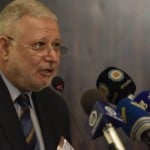
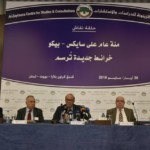
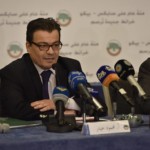
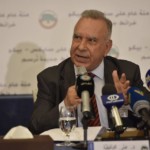
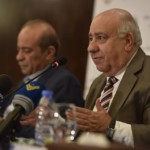
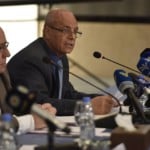
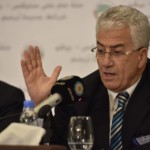
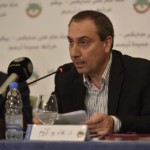
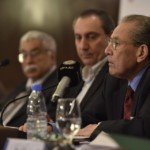
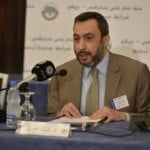
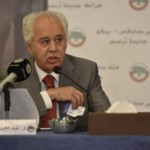
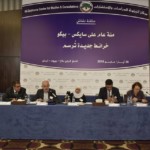
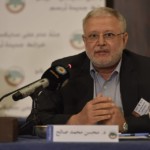
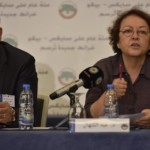
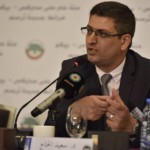
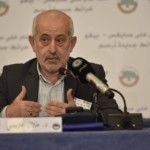
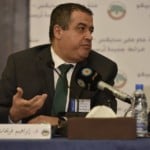
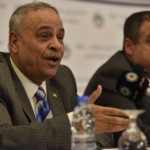
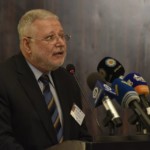

Leave A Comment